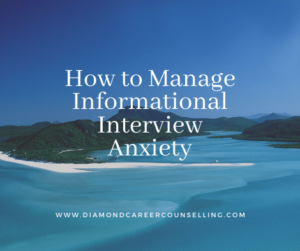How to Manage Informational Interview Anxiety

Are you hoping to request an informational interview but feeling paralyzed by your anxiety related to reaching out to other professionals and/or companies? Working the hidden job market is not always a comfortable process.
If you feel anxious or nervous about this process, you aren’t alone – many people find the process of asking for an informational interview to be stressful and nerve-racking. Here are a few things to keep in mind as you navigate this the process.
What You Need to Understand about Informational Interview Anxiety.
1. Remember that just because you’re anxious about requesting an information interview, this doesn’t mean that something is wrong with you or your idea to reach out and make connections.
In fact, anxiety and nervousness is completely normal in this situation, and most people would likely experience some degree of anxiety in approaching another person or company, especially when we don’t have a pre-existing connection.
2. Anxiety is an adaptive, built-in mechanism that is designed to protect us from real life-threatening or dangerous situations. For example, if you see a wild dog growling at you, it appears to have rabies, and it starts to approach you, it makes sense that you would fear for your safety.
Even before you have time to think about what’s happening, inside your brain, not too far behind your ears, you have two almond-shaped amygdala’s that work like an alarm system. As soon as they detect something that is perceived as threatening (real or imagined) our “fight-flight-freeze” response becomes activated and starts sending out a myriad of signals to our entire body.
Have you heard of the term “scared shitless”? This refers to just one example of a stress response in which the body tries to halt all processes unrelated survival, such as digestion, so that there is more energy to escape danger. If you’re scared shitless, you might have experienced “the runs” or diarrhea as it’s your body’s attempt to evacuate anything that will weigh or slow you down in your escape of the dog. Of course, this is just one symptom of anxiety and there are many others.
Anxiety is helpful when there is a true danger or something that might harm us. However, in the case of reaching out for an informational interview, there is no true life-threatening danger. Yes, it’s uncomfortable and nerve-racking but that is not the same as danger. You requesting a meeting with someone might actually be very helpful for your next career steps.
3. It’s unreasonable to assume that you can get rid of your anxious thoughts, feelings or nervous bodily sensations. You can’t change how your biology works on such a fundamental level. Instead, you can get better at recognizing your anxiety and being able to manage it so that it doesn’t prevent you from taking action steps (e.g., requesting an informational interview) toward your career goals.
How to Manage Informational Interview Anxiety
Here are a few tips to help you manage your informational interview anxiety. There are many different approaches to coping with this anxiety, however, one common approach that I will briefly discuss is to examine the role that your thoughts play in asking for such a meeting.
There is no such thing as a right or wrong way to think, but the question to always keep in mind is: Is this mindset or way of thinking holding me back from asking for an informational interview or is this mindset supporting me to take steps toward asking for an informational interview?
Is this way of thinking moving me close to my career goals or is it holding me back and keeping me stuck?
The goal is to recognize ways of thinking that might be preventing you from taking action, and to then challenge those thoughts, and develop more supportive beliefs and self-talk.
This is not an easy task to do, but once you can build the skills of re-training your brain, it is often well worth the effort.
Step 1: Learn about the types of thinking that might keep you stuck
I usually encourage people to begin by identifying the attitudes they hold that are unhelpful. For instance, here is a great list of broad categories and types of unhelpful thinking styles. Read through the list and ask yourself if you can recognize any of those unhelpful thinking styles as it relates to your goal of doing an informational interview.
Step 2: Identify your specific thoughts that keep you stuck
Second, identify a few of your specific attitudes or thoughts that you know are no longer helping you. What are they?
I highly recommend writing these down in a journal or notebook as it’s difficult to do this work off the top of your head. On the top of one page, write down the unhelpful thought. Put each unhelpful thought on its own page.
I often hear the example: I don’t want to bother other people that I don’t know. I’m worried that asking for an informational interview will annoy them or become a burden. This might be an example of mind-reading where you assume you know how others will think, behave or feel. It might also be considered a form of catastrophizing where you are imagining things will be worse than they likely would be.
Step 3: Begin deactivating the power of your unhelpful attitudes and thoughts.
Try to find ways of deconstructing or getting unstuck from your unhelpful thoughts. This is sometimes referred to as learning to challenge your unhelpful thoughts. It’s a way of starting to deactivate the power around those unhelpful thoughts and makes those ways of thinking feel less valid. For instance, what reasons can you tell yourself for why those ways of thinking are unhelpful?
In the above example, ask yourself a question such as: What evidence do I have that I will be an annoyance? Or: Are my concerns based on my fears and worries or are they based on something factual or something that is likely to happen?
In other words, do you really know for sure that the receiving person will feel annoyed with you or will feel like you’re a burden? Are there alternative perspectives that you might adopt in this situation?
With anxiety, it’s important to recognize that our anxious brains often go to the worst-case scenarios. This is a symptom of the anxiety and not necessarily a reflection of what is going to actually happen in reality.
You might also ask yourself questions such as: What is the worst thing that might happen if I reach out and request an informational interview? Also: What is possible that could happen versus what is a more realistic or likely outcome of me asking for an informational interview?
Step 4: Identify More Empowering Perspectives that Propel you Forward
The ultimate goal is to find more supportive and empowering attitudes that will encourage you to take action toward requesting an informational interview. What would that more supportive self-talk look like for you? While this might be deeply personal, let me share a few perspectives and examples within the context of wanting to ask for an informational interview.
1. Remember, no one develops their career or gets a job without the help of others. It’s impossible. We’re all interconnected and reliant on others to help us learn, and to take advantage of new opportunities. Nothing happens in isolation.
Think back to your last job, – you probably needed a reference of some sort. Do you think the person you asked for a reference was annoyed, happy, or indifferent to help and provide you with the job reference?
2. The person that you respect or admire (i.e., the person you are wanting to do the informatinal interview with), – they likely developed into the professional that they are, as a result of their connections with others, and it’s likely that they had to request the help or time of someone else, regardless of whether or not it was a personal connection.
Try using the power of comparisons. For instance, you might think that it’d be easier to apply to a job posting and go through a formal interview process as you might think it’s more proper or less annoying to the other person. But is that true? Even a formal interview would require the time of someone else to get to know you. How is an informational interview that much different?
3. Try focusing on what you have to gain by requesting an informational interview rather than focusing on something negative like what might go wrong. For instance, you might gain new contacts and discover opportunities that you didn’t know existed.
A best-case scenario would be that eventually that person or company informs you of an opportunity that comes available. What’s the worst-case scenario that might happen if you request an information interview? For instance – maybe you don’t hear back. How could you cope with that?
Working the hidden job market and doing information interviews isn’t always easy, but often, it increases your chances of finding a job. Read more on why job-postings aren’t always the best place to focus your energy during your job search.
There are other ways to cope with information interview anxiety as well. For instance, in addition to examining our own attitudes, you might focus on what you can do to prepare such as preparing an email or phone script or devising a list of the questions that you might ask in an informational interview.
Author: Dr. Allison Foskett, Registered Counselling Psychologist, Edmonton, Alberta
To learn more about my background and training as a registered psychologist, please visit my About Me page
If you’re interested in exploring career counselling services, career assessments, or individual therapy for a range of mental health concerns, please contact me for a free 15-minute phone consultation.



